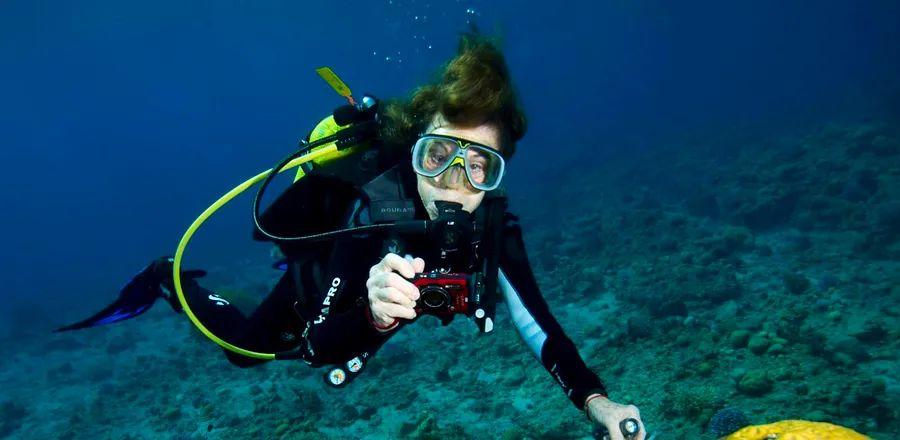Can Cruise Ships Be Beneficial for the Oceans? This Renowned Marine Biologist Believes They Can.

With the cruise industry steering towards a sustainable future and ocean protection, it’s forming some unexpected alliances. Last year, renowned marine biologist and oceanographer Dr. Sylvia Earle stepped into the spotlight, becoming the godmother of the Explora I, the inaugural 922-passenger vessel from the new luxury cruise line Explora Journeys.
Explora Journeys is part of MSC Group, the largest shipping company in the world and the parent of MSC Cruises, which operates a fleet of megaships, some accommodating over 4,000 passengers.
In a November interview with Dinogo while the ship was docked in New York for her naming ceremony, 88-year-old Earle expressed her enthusiasm for partnering with a cruise and shipping line. She regards the Explora Journeys vessels—two more set to launch this year, with four additional ships to follow—as platforms to advocate for the urgent need for ocean conservation.

Photo by Ivan Sarfatti
A shared passion between the marine biologist and the shipping giant is coral conservation. At MSC’s private sanctuary in the Bahamas, Ocean Cay MSC Marine Reserve, established in 2018 on previously industrial land scarred by sand mining, funding from the non-profit MSC Foundation has supported coral restoration efforts. In July 2023, Earle’s nonprofit Mission Blue recognized this project as a “hope spot”, emphasizing the importance of preserving marine ecosystems. Mission Blue has identified around 160 similar sites worldwide, highlighting areas critical to ocean health that require protection or are safeguarded by dedicated advocates like the MSC Foundation.
“Ocean Cay is making significant strides both in the ocean and on land, restoring thousands of native trees and shrubs,” Earle notes.
Marine life, such as loggerhead sea turtles, is thriving in the surrounding waters. The eco-island is also a favored stop for passengers on MSC and Explora Journeys vessels.
Of course, I want to collaborate with my fellow scientists and conservationists, but if we only keep conversing among ourselves, we won’t generate the global awareness necessary...
Cruise lines are not only pouring billions into new engines and technologies but also exploring sustainable fuels and eco-friendly solutions for the future, including batteries and hydrogen fuel cells, aiming for net-zero emissions by 2050. However, they frequently face strong criticism from environmental advocacy groups.
Earle believes that cruise lines are not the main villains in ocean conservation. She argues that industrial fishing poses a much greater threat to marine ecosystems than cruise ships.
“When I consider industrial fishing, where the aim is to harvest wild animals for profit, the impact is even more significant than the issues often attributed to the cruise industry—such as carbon emissions, noise pollution, and disturbing untouched marine areas,” Earle states. “Why aren’t we examining fishing fleets with the same level of concern? I think it’s time to hold them accountable.”
She emphasizes the need for a broader effort to encourage people to care more about the ocean. Partnering with MSC is one strategy she hopes will help achieve this.
MSC is “deeply committed to ocean conservation, and perhaps there’s a chance to inspire people on a different level,” she remarks. “Naturally, I wish to collaborate with fellow scientists and conservationists, but if we only engage in dialogue among ourselves, we won’t foster the global awareness necessary to guide us in the right direction.”

Photo by John Nussbaum
She views cruise passengers as an audience eager to embrace a sustainability message.
“They are on the ocean,” she explains. “They are there to enjoy themselves, and perhaps they could enjoy it even more if they realized they have the power to help maintain the ocean's health and restore areas. We aim to provide them with insights that enhance their learning opportunities.”
She adds, “You may wonder why I would partner with a cruise line? The MSC Foundation and Explora are already dedicated to creating positive change, and there’s an engaged audience. So, I think, why wouldn’t I want to join forces? It’s a privilege to be invited.”
On the Explora I, children aged 6 to 12 can take part in the complimentary Nautilus Club youth program, which includes workshops and discussions on marine conservation, the ship's sustainability initiatives, and the effects of tourism on Caribbean and Mediterranean destinations. Additionally, there are lectures for all passengers led by scientists, including marine biologists.
During a recent Explora I Caribbean voyage, the onboard lecturer was Max van Aalst, a marine biologist and director of the BRANCH Coral Foundation. He presented his coral restoration efforts in Curaçao and guided snorkeling excursions. Why did he choose to participate in this voyage? “I agreed because it’s Sylvia Earle’s ship,” he shared with his audience.

1

2

3

4

5
Evaluation :
5/5